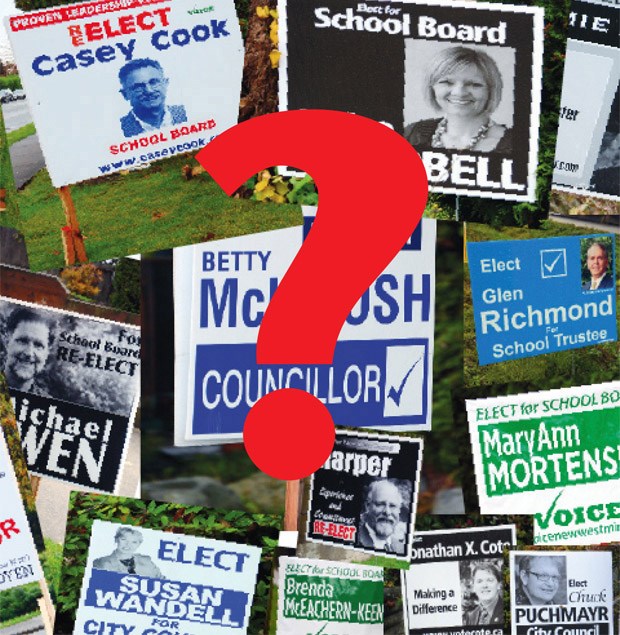 She was bent over at the end of the driveway, digging ferociously with a trowel.
She was bent over at the end of the driveway, digging ferociously with a trowel.
“I found another one. These things are sprouting like crazy. I thought we wiped them out four years ago.”
I nodded soberly. “Must be the rain. I miss the drought.”
The offending specimen made a sucking sound as she pulled it out by the roots.
“Careful,” I said. “There’s a $1,000 fine for doing that.”
This was true. Under the Canada Elections Act, removing or defacing a candidate’s lawn sign is punishable by a fine or up to three months in jail.
But good lord, how else do you prevent them from taking hold? Just four weeks into the campaign and Vote For Me signs are already spreading like blackberry bushes, or zucchini, or chlamydia.
Campaign signs are a scourge.
They are visual pollution.
They add nothing to political discourse.
They are allowed to intrude on public spaces where other signs may not.
But they work, damn it, building name recognition for candidates.
Mostly, it’s up to municipalities to decide when and where signs may appear (the Elections Act says landlords and condo corporations can’t bar apartment renters and condo owners from erecting then on their homes, but is otherwise silent). Saanich allows signs beside the road, but not in medians, traffic islands and planting beds, or in parks or on other municipal land. Victoria has sent candidates lists of parks, playing fields, grassy medians and boulevards where signs aren’t allowed for fear they will interfere with trees, plants or underground irrigation systems. Nothing that interferes with traffic safety, either.
Some jurisdictions place limits on how long signs may stand. Many only permit them in the last 30 days of a campaign. Langford, bless its soul, demands their removal within seven days of the election.
The Transportation Ministry has an even tighter deadline: If highway-side signs aren’t removed on the first working day after the election, road-maintenance staff may take them down and bill the owner.
Sometimes, the public gets fed up about the roadside forests that suddenly appear at election time. Complaints about the plague of placards proliferating at high-profile intersections prompted Comox council to tighten its rules after the 2011 federal election: Signs are banned from all public land except boulevards fronting private property. In Oak Bay, a combination of tradition and regulation means signs appear only on or immediately adjacent to private property.
That can confound strategists who gradually increase the number of signs on public land until, just before the end of the campaign, they are suddenly thicker than the hair™ on Donald Trump’s head, creating the illusion of political momentum. And it is, of course, just an illusion; while the number of signs on private property can reflect a candidate’s actual support, those on public property prove nothing except a party’s ability to pay for a sign and round up a guy with a truck.
Signs are ripe for parody. In Ontario, a sign similar to those used by the Conservatives urges voters to back Darth Vader of the Your Galactic Empire party. “Together, we can rule the galaxy,” it says. Likewise, somebody in Quebec is producing knock-off Liberal signs backing Gowron, the chancellor of Star Trek’s Klingon High Council, in the fictitious riding of Qo’nos-Praxis-Verdun.
A certain amount of mischief is inevitable. (In B.C., where municipal elections are always held in November, candidates know to take their signs down on Halloween.) Savvy political organizers will turn the vandalism to their advantage, complaining to the media, as the resulting coverage A) makes their opponents look like thugs and B) earns free publicity for their candidate.
During this spring’s Alberta election campaign, Progressive Conservative justice minister Jonathan Denis was put in the awkward position of having to deny to the National Post that he had defaced his own signs (the D was altered so that they read “Jonathan Penis”) in an attempt to gain attention. The Post also said a first-time Calgary council candidate enjoyed a bump in name recognition — and was, in fact, elected — after someone changed his signs from RICHARD POOTMANS to HARD POO MAN.
Not sure this is what Dad had in mind when he fought for democracy.



